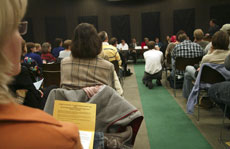Same-sex couples discuss Illinois marriage laws

Online Poster
December 3, 2004
Two same-sex couples shared their personal insights into the everyday obstacles of their lives in a community-based discussion on issues of same-sex marriage and challenges faced by gay- and lesbian-headed families.
The couples were part of an eight-person panel in a presentation called “Leave No Family Behind” at the Champaign Public Library on Thursday night. “Leave No Family Behind” focused on problems same-sex families face under current Illinois marriage laws.
“I’ve faced a lot of financial difficulties, job difficulties, discrimination and I’ve lost a lot,” Lynn Sprout said. “I feel if I had been married to my partner, I wouldn’t have lost as much.”
Sprout’s life partner, Kathie Spegal, said many people don’t always consider the two a couple.
“It depends on where we are if we feel married,” she said. “Our relationship should be validated. We do things any other couple would do.”
Get The Daily Illini in your inbox!
Panelist Ramona Faith Oswald, a professor of human and community development, discussed and disputed reasons why society might oppose same-sex marriage.
“Some people are afraid that gay and lesbian parents will raise gay and lesbian children,” she said. “I’d like to point out that most gays and lesbians are children of heterosexual parents.”
According to the 2000 census, there are 359 same-sex couples in Illinois. One-third of lesbian couples and one-fourth of gay couples are raising children, Oswald said. She said she has found that children of same-sex couples are the same as children of heterosexuals in terms of cognitive development, academic achievement and identifying with their gender during her 20 years of research. She compared this aspect of homophobia to other forms of prejudice.
“It would be outrageous to say to African Americans, ‘you shouldn’t have children’ because there’s racism,” she said.
Members on the panel also shared stories of gays and lesbians who weren’t allowed into hospital rooms to be with their seriously ill or dying partners.
Dixie Spencer’s insurance is covered on the plan of her partner, Patty Cutright. However, the couple is frustrated by the effort they have to take to obtain this simple benefit.
“We have to sign an affidavit every year saying that we are committed,” Spencer said. “I don’t know of many couples that have to prove their commitment every year.”
She said if either of them had a health emergency, they would have to go to lawyers, pay fees and get specific documents to have a chance to gain admittance into the hospital room, and even then they still might be denied.
Hospital visitation as well as medical decision-making, insurance, pension and social security are just a few benefits that are often denied to same-sex couples because they are not legally married.
“The only thing you can say about the tradition of marriage is that it is completely evolving,” said panelist Heather Sawyer of the LAMBDA Legal Defense Fund. “As we learn and as we grow, we should allow our traditions to change. Love and commitment are not finite goods for a (selected few).”
Spegal said she felt her relationship with Sprout was not a threat to anyone, but rather an exemplary one.
John Knight, an attorney for the American Civil Liberties Union, said he thinks same-sex marriage is an emotional, as well as legal, matter.
“Same-sex families are not going to go away, so we need to celebrate them as we do different-sex families,” he said. “People say this is a choice, but it can’t be a choice. Why would you want to choose this given all of the discrimination you face?”






